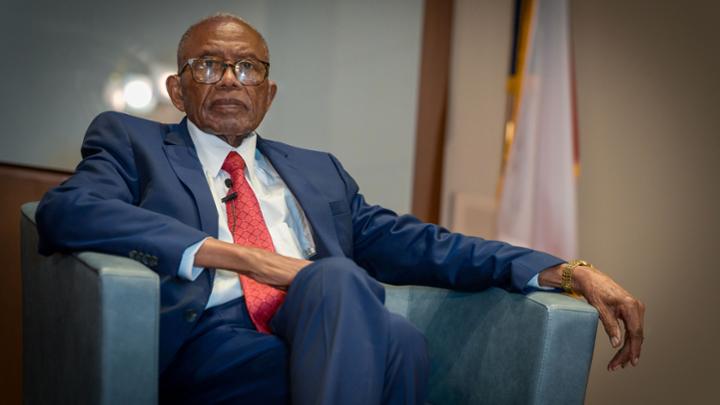The generosity of Mark and Becky Lanier has brought the life and legacy of Fred D. Gray to the Texas Tech School of Law.
There are moments in U.S. history where every person remembers where they were, but there are few people who can say they witnessed it with their own eyes.
Fred D. Gray is one of the few.
On Nov. 30, every seat in the Bill & Carolyn Lanier Auditorium at Texas Tech University’s School of Law was filled. Students of all ages, judges and lawyers, faculty and staff from across campus and members of the Lubbock community gathered to hear Gray recount his life.
Relaxed casually in a seat on the stage, Gray launched into conversation. Just a couple weeks shy of 93 years-old, Gray spoke confidently with precise dates and details of his work with those he referred to as Martin, Rosa and Thurgood – better known to the common citizen as Martin Luther King, Jr., Rosa Parks and Supreme Court Justice Thurgood Marshall.
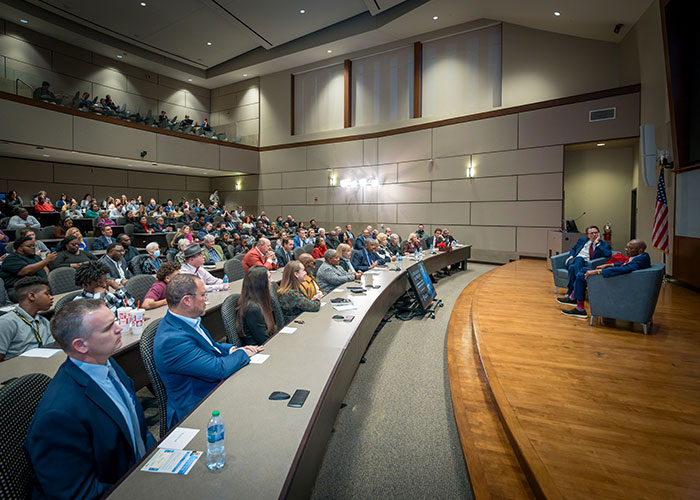
“I was born on Dec. 14, 1930, in Montgomery, Alabama, the cradle of the Confederacy and the site of the beginning of what is now known as the Civil Rights Movement with the beginning of the Montgomery bus boycott on Dec. 5, 1955,” Gray began, speaking with a southern drawl that somehow punctuated and extended his words.
Gray was the youngest of five children growing up in the segregated South, and in his words as a Black man in the South during this time, he only had the opportunity to be a preacher or a teacher. Following his mother’s dreams for her youngest child to be a preacher, he attended Nashville Christian Institute from seventh grade until he graduated at 17.
At that time, he decided he wanted to pursue his alternative career opportunity and enrolled in Alabama State College to become a teacher. While in college, he witnessed firsthand the struggle faced by members of the Black community in Montgomery, particularly with how they were treated when trying to use public transportation.
“I realized that Black people in Montgomery at that time were having a serious problem with how they were being treated or mistreated on the buses,” Gray said. “One man had even been killed as a result of it. So, I secretly decided I was going to finish Alabama State. I was going to go to law school, finish law school, come back to Alabama, take the Alabama bar exam, pass the bar exam, become a lawyer and destroy everything segregated I could find.”
It was illegal at the time for Black men to attend law school in Alabama, so Gray’s pursuit of justice took him north to Cleveland, where he enrolled in Cleveland's Western Reserve University Law School (now Case Western Reserve University). As he learned general law in his classes in Ohio, Gray took it upon himself to research and learn the laws in Alabama, staying true to his pledge to return home and practice law.
At age 23, Gray returned to Montgomery ready to fulfill his promise. He was soon face-to-face with his first opportunity – Claudette Colvin. A predecessor by nine months to the better-known Rosa Parks case, 15-year-old Colvin was arrested in March 1955 for refusing to yield her bus seat to a white passenger.
Although he had only been working as a lawyer in Montgomery for six months, Gray had developed a friendship with Parks, the secretary and youth director of the Montgomery County branch of the National Association for the Advancement of Colored People (NAACP). Through Parks, Gray connected with other prominent members of the community and was first in line to defend Colvin when the time came.
From there, Gray’s career defending civil rights in the courtroom took off. In December 1955, Gray represented Parks after she also refused to move to the back of the bus to make room for white passengers.
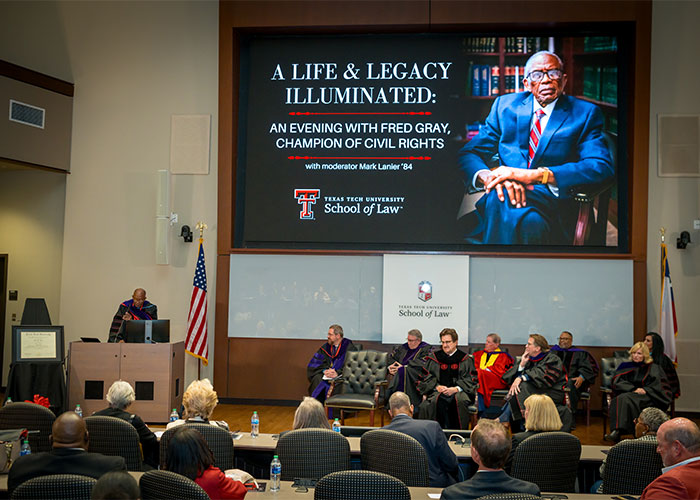
“Since I opened my office, Mrs. Parks had been having lunch with me about three or four days a week in my office,” Gray said. “It was only a block and a half from where she was working. We talked about youth, we talked about Brown v. The Board of Education, which had been decided in 1955, but no desegregation of schools had taken place in Montgomery. We talked about what a person should do if they were asked to get up and give their seat on the bus – and she had to ride the bus twice a day. She never told me if the opportunity presented itself, she would not get up. But I had a feeling that if it did, she would not get up. That happened on Dec. 1.”
In conjunction with his representation of Parks, Gray was central to making plans for the Montgomery bus boycott. The night of Parks’ arrest, Gray recalled a meeting where he and Jo Ann Robinson made the plan. They selected E.D. Nixon to serve as treasurer and help raise money for their cause, Rufus Lewis to help coordinate transportation to allow people to stay off the buses and, possibly most importantly, Martin Luther King Jr., to rally the rest of the Black community.
“The community accepted it. That was the plan,” Gray said with authority. “That’s what they decided and at the meeting at the Mount Zion Methodist Church on December the first, after Mrs. Parks’ arrest, the same group that selected Reverend King to be the spokesman selected Fred Gray to be responsible for their legal guidance. And the rest of it is history.”
While Gray sums up “the rest of it” as history, the next 68 years were marked with iconic legal battles that changed the landscape of civil rights in the U.S. He was front and center in the courtroom to represent those who were seeking equality under the law.
Through the rest of the evening, Gray walked those in attendance at the law school through his landmark cases, weaving together legal commentary with his personal connections to civil rights leaders.
During the historic Montgomery bus boycott, Gray played a lead role as legal counsel in Browder v. Gayle, which led to the Supreme Court’s ruling prohibiting segregation on city buses.
From there, his career was launched as civil rights activists sought Gray’s legal expertise. He provided legal counsel to the NAACP when Attorney General John Patterson effectively outlawed the organization in 1956 until it could operate again in 1964. He defended King against tax evasion to an all-white jury and won an acquittal in 1960. The same year, he fought for due process and equal protection of the law for nine Alabama State College students who were expelled for participating in sit-ins. In March 1965, Gray filed a class-action lawsuit on behalf of those seeking permission to march from Selma to Montgomery.
“I had my work cut out for me on that one,” Gray said. “I got in my car, drove to Selma, found Dr. King. I didn't want to talk to anybody but him. I didn't call him Dr. King, I called him Martin. He didn’t call me Attorney Gray. He called me Fred.
“I told him what had just happened within the next hour and a half, and I said, ‘This is the most important thing that has happened to us in the Civil Rights Movement. This case can probably be the most important for all of us, and I think we stand a good chance of winning it. I can’t assure you that, but I think we can.’”
Gray’s gut instinct proved correct, because within the next two days they won court-ordered protection from the state for the marchers.
In the subsequent years, Gray would litigate Supreme Court cases, including Gomillion v. Lightfoot, which addressed racial gerrymandering. He also tirelessly pursued school integration. Gray was the plaintiff’s attorney in Franklin v. Auburn, which desegregated Auburn University. He then went on to file and win Lee v. Macon County Board of Education, leading to the integration of all of Alabama’s educational institutions.
Beyond his work tackling segregation, Gray was an attorney for the victims of the Tuskegee Syphilis Study in a lawsuit against Alabama and the U.S. Public Health Service, securing $10 million in compensation and treatment for the victims and their families.
“Five of my cases were precedent-setting cases filed by persons in Macon County, Alabama, but have endured to the benefit of most of the citizens in this country,” Gray said. “All of that, the people need to know. So, I say to all of you and all of us and all persons who are interested in civil rights: keep pushing, keep going, set the record straight.”
Preserving His Legacy
One Texas Tech alumnus took Gray’s advice and began working to ensure these stories and Gray’s impact did not just remain history. He was determined to ensure the legacy Gray had established in civil rights and constitutional law lived on.
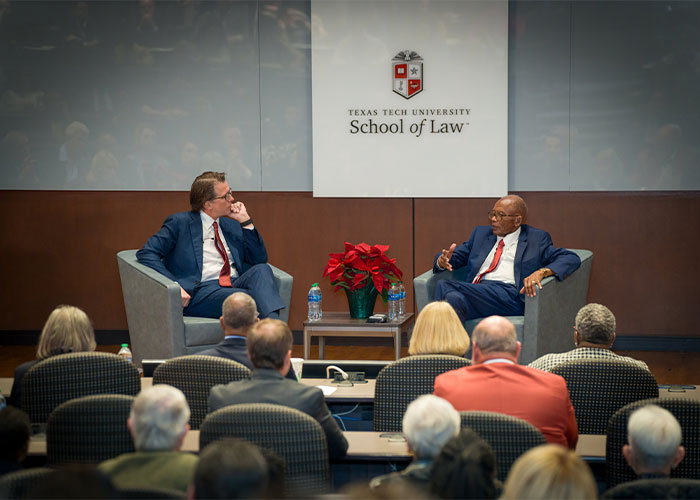
Mark Lanier, a 1984 graduate of the Texas Tech School of Law, met Gray through the former president of his undergraduate alma mater, L. Randolph Lowry of Lipscomb University.
Gray became fast friends with Mark and his wife Becky. Becky, also a lawyer, received her undergraduate degree from Texas Tech and is an honorary graduate of the law school. They were inspired by his life’s work and knew they wanted to preserve his legacy in a way that could motivate aspiring lawyers to continue the fight for justice for all.
Mark and Becky have been loyal supporters of the Texas Tech law school and recognized an opportunity to combine their respect for Gray with their love of Texas Tech – creating the Fred Gray Endowed Chair for Civil Rights and Constitutional Law with a gift to the law school. Texas Tech also presented him with an honorary degree from the School of Law.
“This was important to us personally because it brings together two parts of our lives that are very important to us,” Becky said. “First is the respect and admiration we have for the work that Fred Gray has done and continues to do. The second thing that it brings in is our love for Texas Tech.
“We know we owe so much to the university, all of the support and the opportunities that we were given. It is really exciting for us to see the university bringing in the contributions of Mr. Gray’s life work. It brings us great joy to know that this endowed chair is just going to be another way that the university and the law school continue to shine a light the entire community is going to see on the importance of equality in the law.”
Those sentiments were shared by Mark.
“He has jumped into this and given us something most valuable to him, and that's his time,” Mark said, a beaming smile across his face. “And it is a great honor to have a chair that seeks to continue the life and legacy of his strong civil rights work at what I consider to be the best law school in the United States of America.”
Gray’s remarkable career has earned him many accolades including serving as the first Black president of the Alabama Bar Association in 2002 and being awarded the Presidential Medal of Freedom in 2022. However, the Laniers’ gift marks the first academic chair named in his honor.
“I humbly accept and acknowledge this honor and this degree on behalf of all of the clients who during the last 69 years have trusted me to handle their legal cases,” Gray said in his remarks following the announcement. “I particularly accept it on behalf of Claudette, on behalf of those 623 men in the study, on behalf of all those unknown heroes and clients whose names never appear in print media, whose faces never appear on television. They are the persons who laid the foundation so that you can honor me here this evening. I accept this award on their behalf.”
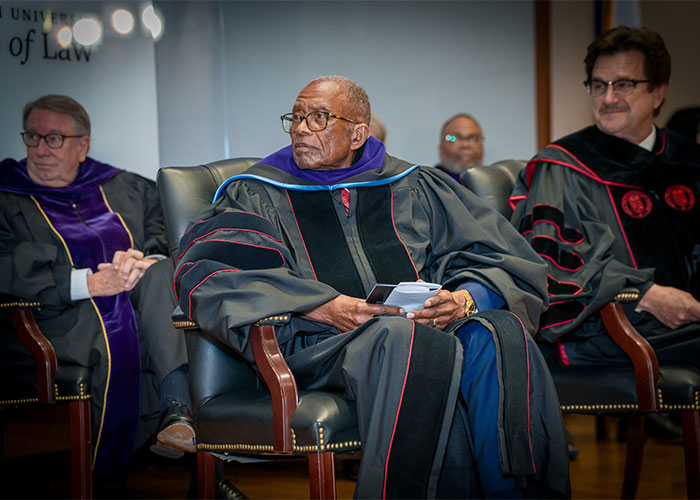
It is the Laniers’ hope that the law school is able to find an individual to fill the position that emulates two characteristics of Gray that they find most admirable – a strong moral sense of what is right and wrong and a strong work ethic.
“He works diligently one step at a time to achieve masterful goals,” Mark said. “And I think both of those attributes, a sense of moral justice and a sense of hard work, are a one-two punch that will take people further than they ever dreamed.”
Another benefit of having an endowed chair is the ability of the school to attract high-quality candidates for the position. Funds from the Laniers’ gift will be used to provide an expense account, additional salary and other financial support for the professor.
“We are incredibly grateful to Mark and Becky for their vision and generosity that made this all possible,” said School of Law Dean and W. Frank Newton Professor of Law Jack Wade Nowlin. “The chair, even more than a professorship, carries with it prestige. And then, the fact that the chair is in honor of a figure of the stature of Fred Gray makes it that much more special. His impact on the law is beyond measure.”
Above all, it is the hope of the Laniers and those in the School of Law that students are attentive to and know the importance of equality in the law, and they believe this endowed chair has the potential to cultivate that knowledge.
“It is our responsibility to leave this world a better place than it was when we arrived,” Mark said. “And I think this gives us a chance to do that. It takes one student to become Fred Gray. Texas Tech may have that one student 10 times, 100 times, 1,000 times, who knows? But let's sow the seed and see what grows up.”

